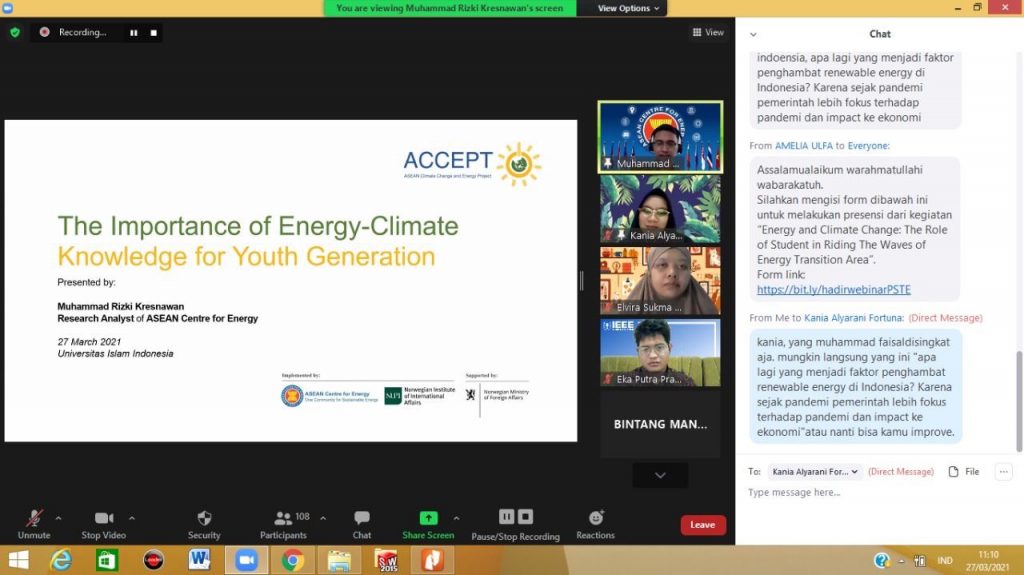[vc_row css=”.vc_custom_1565542682041{margin-right: 0px !important;margin-left: 0px !important;}”][vc_column css=”.vc_custom_1565542696462{padding-right: 0px !important;padding-left: 0px !important;}”][vc_single_image image=”10512″ img_size=”large” alignment=”center” el_class=”banner-event”][/vc_column][/vc_row][vc_row css=”.vc_custom_1565542751414{margin-right: 0px !important;margin-left: 0px !important;}”][vc_column width=”1/4″][/vc_column][vc_column width=”1/2″ css=”.vc_custom_1565622195563{padding-bottom: 50px !important;}”][vc_column_text el_class=”title-event”][post_title][/vc_column_text][vc_column_text el_class=”date-venue-news”]Online, 27 March 2021[/vc_column_text][vc_column_text el_class=”text-par-news”]On Saturday, 27 March 2021, ACCEPT’s research analyst, Mr. Muhammad Rizki Kresnawan, was invited as a guest lecture in virtual Webinar Series held by Electrical Engineering Programme in Universitas Islam Indonesia (UII) titled “Energy and Climate Change: The Role of Student in Riding the waves of Energy Transition Era”.
During the webinar, Mr. Rizki addressed the important energy-climate understanding for youth through four key topics that young people should be aware of, including why the change from fossil fuel energy to green energy is so critical today.

Based on his experience in working energy-climate issues in ASEAN region, he started to clarify how global warming occurs and what the primary cause is that usually lied by the misconception. Then he proceeds to put the ASEAN energy landscape background in order to give the participants a viewpoint on the current situation of the ASEAN energy landscape, which is still dependent on fossil fuel, and the effect of the generated pollution on the atmosphere.
After outlining his point of view, he went into further depth on how the youth should concentrate their attention on climate action. Many polls indicate that youth figures will play an important role in the region’s future. Youth, as the backbone of the nation, will almost definitely be a game changer. This is bolstered by the fact that potential climate change would have a strong effect on the younger generation. At the end of the lecture, he gave the audience four main takeaways, which are detailed below:
- Since the future energy pipeline is in “their hands,” youth must retain their interest in the energy-climate nexus.
- The transition to a low-carbon world would be accelerated by a synergistic combination of “hard science” and “soft science.”
- Energy transition necessarily requires “energy-climate minded engineers” of climate change mitigation options in addition to energy infrastructure strategies offered by “ground engineers.”
- Academic institutions must be able to have a “supportive environment” for their students in order to satisfy the demands of “energy-climate minded engineers.”
Mr Rizki concluded at the end of his presentation that the youth should begin to develop a so-called energy-climate design thinking to break the silos in both sectors that can ended the common practice for both sectors to work individually.[/vc_column_text][vc_column_text el_class=”photo-caption-news”]MRK[/vc_column_text][vc_tweetmeme][/vc_column][vc_column width=”1/4″][/vc_column][/vc_row]











